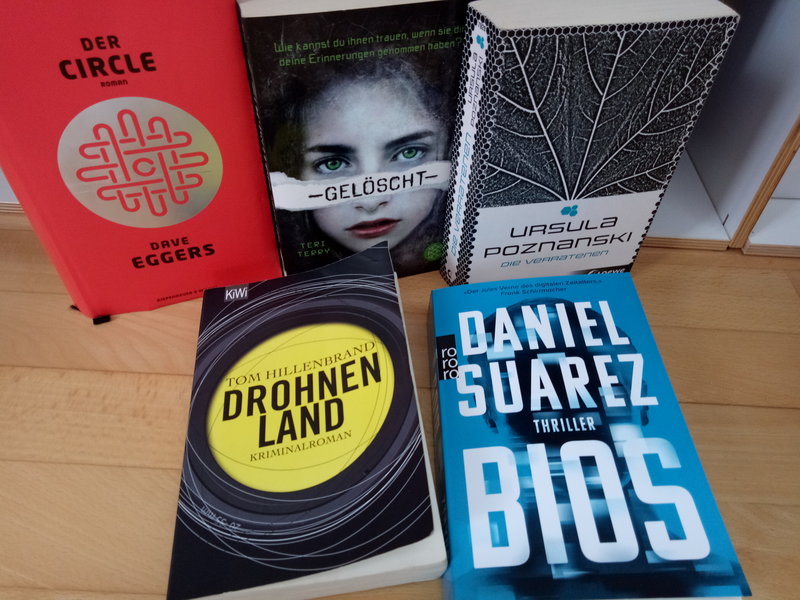
Futuristic Fiction by Daniel Suarez (BIOS), Dave Eggers (The Circle), Tom Hillenbrandt (Drohnenland), Teri Terry (Slated), and Ursula Poznanski (Eleria)
Good fiction about future is visionary, entertaining, and often also critics society. Some recommended books of this genre cover topics like indivisualism, freedom, transparency, and surveillance.
“Post-privacy” as a deliberate decision, often in a partial and artistically exagarrated way, tries to overcome the classic concept of privacy and contrast it with a provocative statement, provided having sufficient privileges to act his way. As a categorical imperative, it would become absurd, as just as Dave Eggers exaggerates and entertainingly takes to its conclusion in his grotesque novel The Circle.
 In Tom Hillenbrand’s novel Drohnenland (Drone Country), the idea of transparency leads to a technocratic system of surveillance that creates security and prosperity for most of its members, albeit being prone to manipulation. Self-driving cars, drones, smart glasses, and an overly blind trust in technological progress, at the same time as many parts of Europe have vanished below the ocean as a consequence of climate change, picture a world that can rightly be described as near-future fiction with a satirical glimpse on our contemporary society.
In Tom Hillenbrand’s novel Drohnenland (Drone Country), the idea of transparency leads to a technocratic system of surveillance that creates security and prosperity for most of its members, albeit being prone to manipulation. Self-driving cars, drones, smart glasses, and an overly blind trust in technological progress, at the same time as many parts of Europe have vanished below the ocean as a consequence of climate change, picture a world that can rightly be described as near-future fiction with a satirical glimpse on our contemporary society.
Another satiric ciriticism of society Gesellschaftskritik in the guise of a science fiction novel, Quality Land by Marc-Uwe Kling, a famous poetry slam artist and author of the Känguruh-Chronicals, exposes technological progress as regression.
In BIOS, Daniel Suarez designs a future society shaped by biotechnology that doesn’t stop at genetically manipulating identity. Unlike many other Western stories of this kind, his vision of the future takes place in Southeast Asia, after Europe and the USA have lost their former supremacy and their citizens are now coming to Singapore as economic refugees. The protagonist loses his identity when waking up in the body of his biggest enemy.
Friend and foe are often not as easy to distinguish as totalitarian societies would like. In her Eleria Trilogy, the Austrian crime and youth author Ursula Poznanski depicts a world after an ecological catastrophe where only few cities are left inhabited under glass domes. When the ambitious student Eleria has to leave this world unexpectedly, she gets to know another side of the truth.
Last but not least, Slated, a trilogy by Teri Terry, is a futuristic dystopy, where a young protagonist has to find out that nothing is as it seemed. As a measure of resocialization, the young protagonist’s memory was erased so that she could have a second chance as a new person. Her former identiy has been lost forever or so it seems…
None of these books are about spaceships or aliens, because humanity itself and its inventions seem alien enough to give us cause for fear or hope for the future. Until then, perhaps there’s still a little time for reading and reflection.


